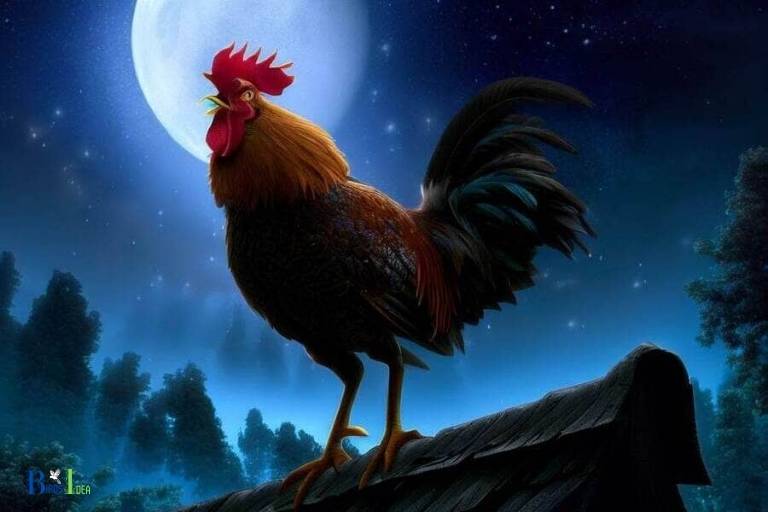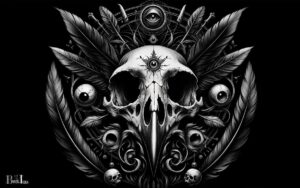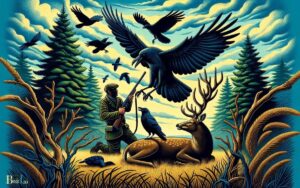What Does It Mean When a Rooster Crows at Night? Threat!
When a rooster crows at night, it usually means that it senses a potential threat or disturbance in its environment.
Roosters are known for their crowing in the early morning, which is a way to announce their territory and presence to other roosters.
However, they can also crow at night if something bothers or disturbs them. There could be various reasons for this behavior, such as the presence of predators, sudden changes in light pattern.
It is essential to be aware of the potential reasons and address any underlying issues like providing safety against predators or maintaining a consistent environment for the rooster to ensure its well-being and minimize nocturnal crowing.
7 Possible Reasons for Rooster Crowing at Night
| Possible Reason for Rooster Crowing at Night | Explanation |
| Mistaking artificial light for sunrise | Roosters may start crowing if they see any artificial light like streetlights or house lights. They might mistake it for the sunrise, which triggers their instinct to crow. |
| Sleep disturbances | If a rooster’s sleep is disrupted for any reason, such as noise, other animals, or a sudden change in temperature, it may start crowing. |
| Territorial behavior | Roosters may crow at night if they feel the need to assert their dominance or warn other animals about their territory. |
| Presence of predators | If a rooster senses a predator or potential threat, it may crow to alert other chickens and scare off the intruder. |
| Inconsistency in their internal clock | Just like humans, roosters can have an irregular sleep schedule or internal clock, which can result in crowing at night. |
| Disturbance in the environment | Unusual events, such as fireworks or thunderstorms, can cause a rooster to crow at night due to the sudden change in the environment. |
| Looking for a mate | Roosters may crow at night if they are looking for a mate or if they are trying to impress a nearby hen. |
Key Takeaway

Five Facts About: Rooster Crowing at Night
What Does It Mean When A Rooster Crows At Night: A Brief Introduction
Have you ever been woken up by the sound of a rooster crowing in the middle of the night? If so, you may be wondering if this is a common occurrence or if it holds any significance.
The Tradition Of Roosters Crowing At Dawn Vs Night
Roosters are known for crowing at dawn, signaling the start of a new day. This is a natural behavior that has been observed for centuries.
However, the tradition of roosters crowing at night is much less common. In fact, it is considered to be an irregular behavior that may indicate a problem.
Here are some of the reasons why a rooster may crow at night:
- Disturbances: If there is a disturbance such as a predator or human activity, roosters may feel threatened and crow as a way to sound the alarm and protect their flock.
- Inconsistency in sleeping pattern: Roosters may crow at night if they have a disrupted sleeping pattern, such as if they have been disturbed or their circadian rhythm has been disrupted.
- Medical conditions: Certain medical conditions or diseases may cause a rooster to crow at night, such as hypertension or hyperthyroidism.
The Significance Of A Rooster Crowing At Night
While roosters crowing at dawn is a natural occurrence, crowing at night is considered to be a sign of unrest.
Here are some common interpretations of the meaning behind a rooster crowing at night:
- Bad omen: In some cultures, a rooster crowing at night is considered to be a bad omen. It is thought to be a sign of impending doom or misfortune.
- Alarming behavior: In many cases, a rooster crowing at night is alarming because it is an irregular behavior. It may indicate that something is off with the rooster or its surroundings, such as a predator lurking in the area or a medical condition.
- Sleep disturbances: Roosters that crow at night can be a nuisance, especially if they are located near residential areas. The loud noise can disturb sleep and cause frustration.
Understanding The Different Reasons Why Roosters Crow
Roosters crow for a variety of reasons, not just at dawn or night.
Here are some of the most common reasons why roosters crow:
- To establish dominance: Roosters are social creatures that establish a hierarchy within their flock. Crowing is a way for them to assert their dominance over other roosters and establish their place in the pecking order.
- To attract mates: Roosters crow to attract mates and signify their sexual maturity. The louder and more frequent the crowing, the more likely they are to attract females.
- To communicate: Roosters use different sounds to communicate with their flock and warn them of potential danger. Crowing is just one of the sounds they make to show their flock where they are and to signal possible threats.
While roosters crowing at night is not a common occurrence, it can hold different meanings depending on the context.
Whether it signifies a medical condition, a disturbance, or a bad omen, understanding the reason behind a rooster’s crowing behavior can help us better care for them and their flock.
Biological Reasons For Roosters Crowing At Night
Understanding The Circadian Rhythm Of Birds
Roosters, just like other birds, have an internal body clock that regulates their daily activities. Some of these activities include feeding, mating, and sleeping.
This internal clock, also known as circadian rhythm, is primarily influenced by external factors such as light and darkness.
The circadian rhythm also regulates the rooster crowing pattern. In the absence of any external factors, roosters tend to crow at intervals of 25 hours.
The Role Of Light And Darkness In Rooster Behavior
Light and darkness play a significant role in the behavior of roosters. Roosters rely on light to regulate their circadian rhythm.
Roosters that live in areas with regular exposure to light tend to crow at dawn, which is the start of their active period.
However, roosters living in areas with irregular light exposure can become confused and crow at inappropriate times.
Artificial lighting within coops and barns can influence rooster behavior and change their crowing patterns.
The Significance Of Hormones And Other Biological Factors In Rooster Behavior
Apart from the circadian rhythm and light exposure, hormones also play a vital role in rooster crowing patterns.
Roosters produce testosterone, which influences their territorial behavior and crowing intensity. As they mature, the level of testosterone increases, making them more aggressive and territorial.
Additionally, other factors such as temperature, age, and health can also affect rooster behavior. Roosters may crow at odd hours if they are ill or experiencing stress.
Roosters crow at night, and this behavior can be attributed to various biological factors such as the circadian rhythm, light exposure, hormones, age, health, and stress levels.
As roosters are known to be territorial, it’s essential to ensure their living conditions are optimal to minimize crowing at the wrong times.
Environmental Factors Contributing To Rooster Crowing At Night
Roosters are known for their crowing at dawn, but it may come as a surprise to hear them crowing in the wee hours of the night.
What does it mean when a rooster crows at night? Let’s delve deeper and explore one of the factors that can contribute to this phenomenon: environmental factors.
Understanding The Influence Of Weather On Rooster Behavior
Weather can have a significant impact on rooster behavior.
Here are some things to keep in mind:
- Roosters are more prone to crow at night during a full moon because they mistake the bright light for morning.
- High humidity can make it harder for roosters to regulate their body temperature. In turn, this can lead to them crowing to communicate with other roosters.
- Cold temperatures can also cause roosters to crow at night as a way to establish dominance over other roosters.
The Role Of Noise Pollution In Rooster Behavior
Noise pollution can disrupt the natural behavior of wildlife, including roosters.
Here are some things to keep in mind:
- Roosters may be more likely to crow at night if there are loud noises in the area, such as construction work or traffic.
- Roosters that are raised in noisy environments may be more likely to crow at night than those that are not.
- Noise pollution can also disrupt the rooster’s sleep pattern, leading to them crowing at unusual times.
Understanding The Impact Of Predators And Other External Factors
Predators, such as foxes and raccoons, can pose a threat to roosters.
Here are some things to keep in mind:
- Roosters may crow at night as a warning signal to other chickens if they sense a predator nearby.
- External lighting, such as street lights or car headlights, can cause roosters to crow at unusual times.
- Roosters may also crow at night if they feel stressed or threatened in any way.
There are various environmental factors that can contribute to a rooster crowing at night. By understanding these factors, we can better comprehend and appreciate the behavior of these fascinating creatures.
Cultural Significance Of Rooster Crowing At Night
Exploring The Cultural Significance Of Roosters In Different Cultures
The image of a rooster crowing at dawn is an iconic one, but what about when a rooster crows at night?
This behavior holds different meanings across cultures, and exploring its significance helps to deepen our understanding of how humans interact with animals and nature.
Here are some cultural perspectives on rooster crowing at night:
- In celtic culture, roosters are a symbol of courage and vigilance. A rooster crowing at night is seen as a sign of danger or approaching death.
- In chinese folklore, the rooster is one of the twelve signs of the zodiac and is associated with prosperity and fidelity. A rooster crowing at night is considered a bad omen, indicating the arrival of evil spirits.
- In hinduism, the rooster represents the sun and is associated with masculinity and fertility. A rooster crowing at night is believed to be a message from the gods, urging people to wake up and begin their day.
Understanding The Role Of Superstition In Rooster Behavior
Roosters are fascinating creatures, and people have long attributed certain behaviors to superstitions. Understanding these superstitions can help us appreciate the role of roosters in different cultures.
Here are some common superstitions related to roosters:
- Roosters crow to announce the coming of a new day, and in some cultures, this sound is believed to ward off evil spirits.
- A rooster crowing at night is often associated with bad luck or impending death. People traditionally avoid making loud noises at night in order to avoid disturbing spirits.
- Roosters are believed to have protective powers, particularly over human offspring. In some cultures, images of roosters are hung in children’s rooms to ward off evil spirits.
The Role Of Roosters In Folklore And Other Traditions
Roosters have played a prominent role in folklore and other cultural traditions for centuries.
From mythology to literature, here are some examples of the role of roosters in different contexts:
- In greek mythology, the rooster is associated with the sun god apollo and is believed to have the power to fend off evil spirits.
- In chaucer’s canterbury tales, the rooster chanticleer is the protagonist of a story about dreams and deceit.
- In japan, the rooster is one of the animals featured in the zodiac and is associated with hard work and perseverance.
- In some native american cultures, roosters are associated with agriculture and fertility and are believed to bring good luck to crops.
Roosters are an important part of many cultures and traditions, and understanding their significance helps us connect with the natural world and the varied beliefs of different peoples.
FAQ Of What Does It Mean When A Rooster Crows At Night
Why Do Roosters Crow At Night?
Is It Bad Luck When A Rooster Crows At Night?
How Do I Stop A Rooster From Crowing At Night?
How Far Can A Rooster Crow Be Heard At Night?
What Does It Mean When A Rooster Crows At Different Times During The Night?
Conclusion
A rooster crowing at night can signify various things depending on where you are and the context of your situation.
But generally, it is said to be a sign of danger or trouble. Hence, it is considered as an omen of bad luck by many people around the world and has earned a reputation for related superstition.
However, roosters crowing at night can also be influenced by other factors such as hunger, noise, and the bird’s hormonal levels or circadian rhythms.
Therefore, it is essential to observe the situation carefully and take necessary precautions when you hear a rooster crowing at night.
However, one should also keep in mind that superstitions shouldn’t rule one’s life and make decisions based on science, logic and reason instead.
At the end of the day, a rooster crowing at night is just a sound, and it is up to us humans to attach the meaning we want to it.





